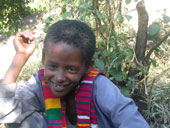
Strengthening Systems and Services to Prevent Mother-to-Child Transmission of HIV
“I first heard of PMTCT during an educational talk at the health center. Now I know that I can live positively and do things to prevent my baby from becoming infected with HIV.”
Abyot, a young woman in Addis Ababa, Ethiopia, learned about prevention of mother-to-child transmission (PMTCT) of HIV/AIDS during her initial prenatal care visit to Addis Ketema Health Center. After receiving PMTCT services including voluntary counseling and testing for HIV, Abyot found out that she is HIV-positive. She is grateful that the health center staff will help her adjust to her diagnosis and minimize the chances of passing the virus to her child during delivery and infancy.
Addis Ketema is one of 23 facilities that began offering a full range of PMTCT services in February 2004 through the Hareg Project, the United States Government’s Presidential Initiative to prevent mother-to-child transmission of HIV in Ethiopia. The PRIME II Project is a lead implementer and coordinator of Hareg activities for the United States Agency for International Development and the Centers for Disease Control, in collaboration with the Ministry of Health, Ethiopia’s HIV/AIDS Prevention Control Office, UNICEF and other partners.
Hareg, or “vine” in Amharic, represents the intergenerational linkages and support that are critical in the fight against HIV/AIDS. According to the Ministry of Health, an estimated 200,000 children are infected with HIV in Ethiopia. More than 90% of HIV/AIDS infections in children are transmitted during pregnancy, delivery and breastfeeding. And while Ethiopia’s overall HIV prevalence is 6.6%, the rate of infection for women ages 15 to 24 is estimated at 21.1%. Launched in September 2003, the Hareg Project targets prenatal care as the entry point for women to receive PMTCT services and strengthens the connections between communities and health care facilities to increase the use of preventive measures and services.
Regional stakeholders prepared for project implementation through workshops at which they formalized commitments and developed action plans to ensure that all systems would be in place to provide prompt and confidential services. System strengthening is a critical component of the Hareg strategy, including the establishment of regional and community teams and a national PMTCT health management information system, along with steps to ensure health worker knowledge and skills, drug supplies and logistics, and optimal client flow.
“We discovered that our facility was poorly arranged in relation to voluntary counseling and testing, prenatal care and family planning services,” confirms Dr. Mesfin, the Medical Director for Assosa Hospital. “This was all due to lack of awareness about optimal client flow. The workshop gave us the opportunity to look back and revise our approaches for the betterment of client satisfaction.”
In a country where two thirds of mothers currently have no access to prenatal care services, the Hareg partners are integrating PMTCT services with broader efforts to improve safe motherhood. In addition to nevirapine prophylaxis to HIV-positive mothers and their infants, key PMTCT services include strengthening prenatal, intrapartum and postpartum care, family planning counseling and services, and counseling on infant feeding options and nutrition.
“Clients’ main requests are psychological support and medication,” says Dr. Yonas, the head of Addis Ketema Health Center. “But even more, stigma in the community is the largest challenge that women face outside the health center.” Taking this into account, the Hareg partners are helping to create stigma alleviation and advocacy linkages through a Community Action for Behavioral Change (CABC) initiative, which also works to prevent HIV/AIDS, generate demand for PMTCT services, promote better nutrition, and involve men in reproductive health. For each facility, teams of health care providers and community leaders have been trained together to carry out CABC activities.
With her appointment card in hand, Abyot returned to Addis Ketema for her next scheduled visit. “I will follow-up like I should and deliver my baby here,” she affirms. “I am reassured that the health center staff will support and care for me.”
The PRIME II Project, funded by USAID and implemented by IntraHealth International and the PRIME partners, works around the world to strengthen the performance of primary providers as they strive to improve family planning and reproductive health services in their communities.
PRIME Voices #30, Ethiopia: Strengthening Systems and Services to Prevent Mother-to-Child Transmission of HIV, 5/28/04.
|











